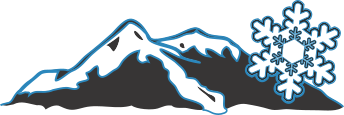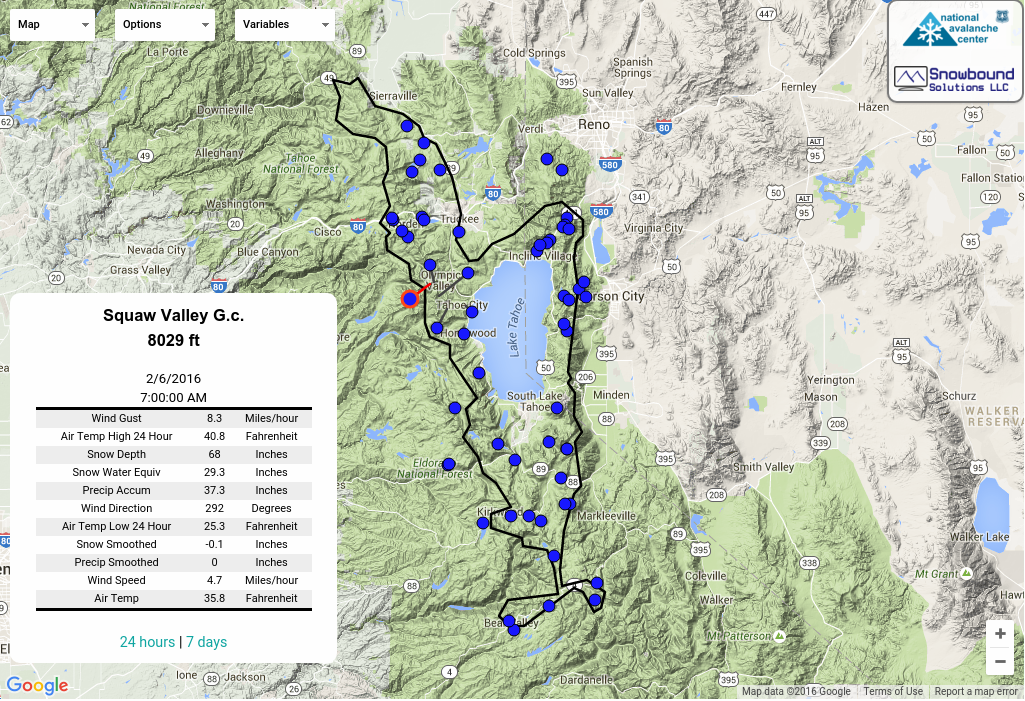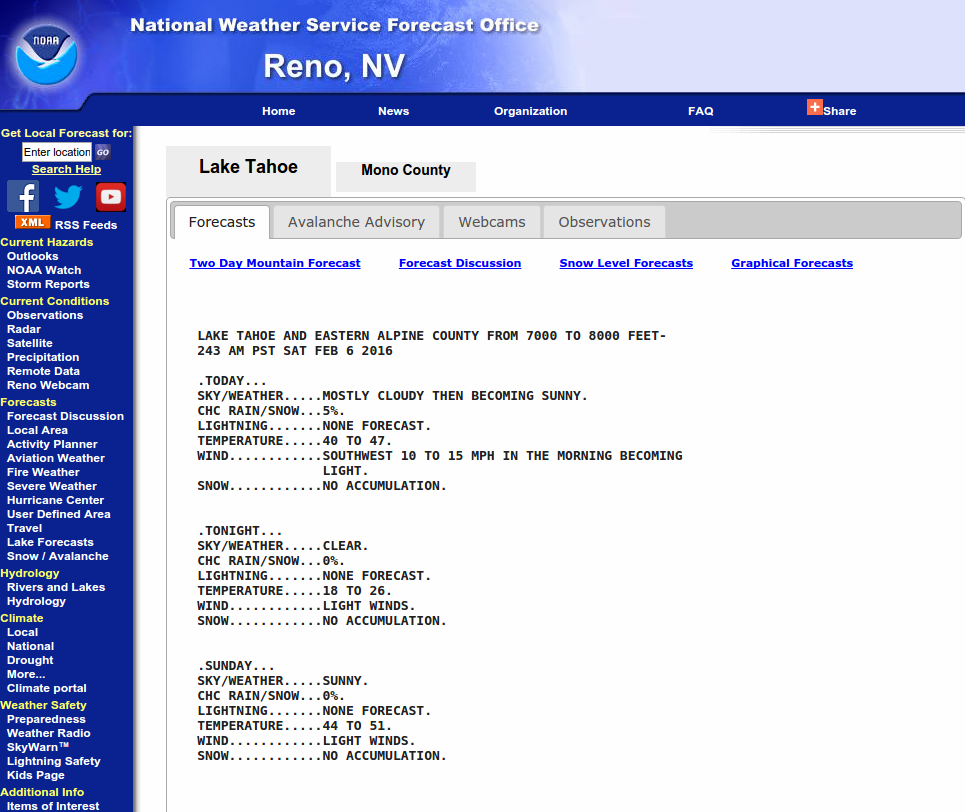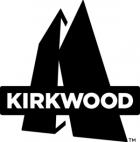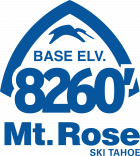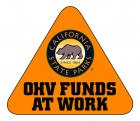
This Avalanche Advisory was published on March 4, 2013:

|
March 4, 2013 at 8:03 am |
|
Pockets of MODERATE avalanche danger exist on all aspects above 7500 ft. due to new snow with weaknesses near the bottom of the new snow. Small human-triggered loose snow avalanches and some small storm slab avalanches will be possible in these areas on slopes 35 degrees and steeper. |
|
|
|
Forecast Discussion:
Storm totals across the forecast area measured 3-6 inches. Areas south of Lake Tahoe received the most snowfall out of this storm. Winds remained light throughout the storm. Clouds dissipated and precipitation ended last night as a high pressure ridge moved into the area. This ridge should bring calm sunny weather to the region for today. The forecast calls for highs in the upper 30's to mid 40's in the mountains today. The wind should shift to the southwest and cloud cover should start to increase this evening ahead of an approaching storm. By tomorrow ridgetop winds could average 50-55 mph with gusts to 80 mph. The forecast calls for a chance of showers tomorrow afternoon as this storm begins to arrive. For more details on the upcoming storm check in with the Reno NWS.
Yesterday on Tamarack Peak (photos and more info) and elsewhere in the Mt. Rose area, winds remained light and did not transport much snow. In areas where wind slabs typically form no wind slabs existed. Observations revealed 2-4 inches of new snow resting on a mix of old snow surfaces ranging from soft snow with a breakable crust below it on sheltered northerly aspects to a firm frozen crust on exposed near and above treeline slopes. The new snow and last week's dusting of snow had buried the rain crust about 6 inches below the surface on those sheltered northerly aspects. Snowpits did reveal a layer of softer snow below this crust, but tests in several areas indicated that fractures should not travel very far in this layer (photo). Warming temperatures throughout the day meant that the snow at the base of the new snow remained lighter than the snow above it. This upside down storm snow allowed skier triggered loose snow sluffs to occur on steep slopes on NW-N-NE-E aspects in this area yesterday (photo). These sluffs did not entrain enough snow to bury a person, but some of them did have enough mass to knock a person off course.
Avalanche Problem #1: Loose Snow Avalanches
Unconsolidated new snow on all aspects with a layer of lighter snow at the base of the new snow will allow loose snow avalanches to continue today. Today's sunshine should also help these loose snow sluffs become more widespread on the sun-exposed southerly aspects. These point releases/sluffs, roller balls, and pinwheels should only involve the new snow. They could be long running and involve enough mass to knock a person off his/her feet or push people into terrain traps. On slopes 35 degrees and steeper on all aspects, human triggered loose wet or dry snow avalanches could occur as well as an isolated natural loose snow avalanche.
Avalanche Problem #2: Storm Slabs
This storm deposited lighter snow below heavier snow. Due to this upside down layering, some soft storm slabs could exist on slopes where the most snow accumulated. Human triggering of these storm slabs will remain possible today on any aspects with a significant amount of new snow above 7500 ft. These slabs should remain small and should only involve the new snow. Terrain traps could easily increase the consequences of these kind of avalanches.
The bottom line:
Pockets of MODERATE avalanche danger exist on all aspects above 7500 ft. due to new snow with weaknesses near the bottom of the new snow. Small human-triggered loose snow avalanches and some small storm slab avalanches will be possible in these areas on slopes 35 degrees and steeper.
Weather Observations from along the Sierra Crest between 8200 ft and 8800 ft:
| 0600 temperature: | 20-30 deg. F. |
| Max. temperature in the last 24 hours: | 30-35 deg. F. |
| Average wind direction during the last 24 hours: | Southwest shifting to the northeast |
| Average wind speed during the last 24 hours: | 10 mph |
| Maximum wind gust in the last 24 hours: | 25 mph |
| New snowfall in the last 24 hours: | 3-6 inches |
| Total snow depth: | 58-82 inches |
Two-Day Mountain Weather Forecast - Produced in partnership with the Reno NWS
For 7000-8000 ft: |
|||
| Monday: | Monday Night: | Tuesday: | |
| Weather: | Sunny | Clear becoming partly cloudy overnight | Mostly cloudy with a slight chance of snow/rain showers during the day. |
| Temperatures: | 40-45 deg. F. | 25-30 deg. F. | 35-40 deg. F. |
| Wind direction: | Variable | Southwest | Southwest |
| Wind speed: | Light | 10-20 mph with gusts to 40 mph after midnight | 20-30 mph with gusts to 40 mph increasing to 50 mph in the afternoon |
| Expected snowfall: | O in. | O in. | O in. |
For 8000-9000 ft: |
|||
| Monday: | Monday Night: | Tuesday: | |
| Weather: | Sunny | Clear becoming partly cloudy overnight | Mostly cloudy with a slight chance of snow showers in the afternoon. |
| Temperatures: | 35-40 deg. F. | 24-29 deg. F. | 30-35 deg. F. |
| Wind direction: | Variable becoming south | Southwest | Southwest |
| Wind speed: | 10-15 mph with gusts to 25 mph in the afternoon | 20-25 mph with gusts to 35 mph increasing to 35-40 mph with gusts to 60 mph after midnight | 40-45 mph with gusts to 65 mph increasing to 50-55 mph with gusts to 80 mph in the afternoon |
| Expected snowfall: | O in. | O in. | O in. |
